Greta Gerwig Lady Bird Interview
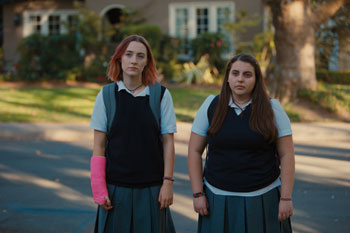
Set in the early 2000s of Sacramento, California.
Cast: Saoirse Ronan, Timothée Chalamet, Odeya Rush
Director: Greta Gerwig
Genre: Comedy, Drama
Running Time: 94 minutes
Synopsis: In the early 2000s, an artistically-inclined seventeen year-old comes of age in Sacramento, California.
Lady Bird
Release Date: February 18th, 2018
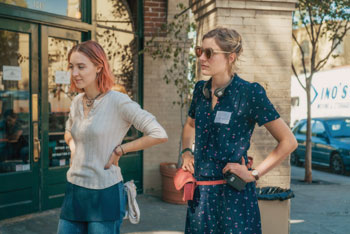 Interview with Writer/Director Greta Gerwig
Interview with Writer/Director Greta Gerwig
Question: Was this film inspired by your own life?
Greta Gerwig: I grew up in Sacramento and I love Sacramento, so the initial impulse to make the film was a desire to write a love letter to a place that only came into focus after I left. It is different to register the depths of your love when you are sixteen and quite sure that 'life" is happening somewhere else.
None of the events in the film literally happened, but there is a core of truth that is connected to a feeling of home and childhood and departure.
Question: Certainly the setting, Sacramento, has special resonance for you. What makes Sacramento a special place?
Greta Gerwig: Joan Didion is from Sacramento and when I discovered her writing as a young teenager, it was spiritually seismic. It was as shattering as if I'd grown up in Dublin and then suddenly read James Joyce. She was my personal poet laureate. It was the first time I experienced an artist's eye looking at my home. I had always thought art and writing had to be about things that were 'important," and I was certain that my life was not all that important. But her writing, so beautiful and clear and specific, was about my world. All the women she wrote about, I knew exactly who they were. The way they organized their closets, the things that they valued, the agrarian middle class worldview that shaped this corner of the country.
When people think about California, they tend to think about San Francisco or Los Angeles, but there is the massive central agricultural valley running down the middle of the state. Sacramento is located at the northern edge of it, and although it is the state capital, there is farmland in its bones. It is not a show-off-y city. It does not brand itself or try to sell itself. There is a modesty and an integrity to the place and the people.
Question: What was the experience of leaving Sacramento like for you and why was that an important component in this story?
Greta Gerwig: One of the very first things I wrote for the film was the scene in college where someone asks Lady Bird where she is from and she lies and says,'San Francisco." That feeling of deep shame that comes from denying who you are was a moment I wanted to work backwards from, to build a movie around it so that when she rejects her home, the audience feels personally betrayed and hurt. As if they, too, were from Sacramento and knew the places and people intimately. Lady Bird sells out her home to look 10% cooler to a stranger she just met.
It is inevitable, perhaps, to deny your roots. I am not a practicing Catholic, but I have always been moved by the story of the Denial of Peter. At the Last Supper, Peter fervently tells Jesus that he will die before he disowns him, but Jesus replies that Peter will deny him three times 'before the rooster crows." Peter still insists that he will not. Of course, Peter ends up denying that he knows Jesus on three separate occasions. The rooster crows just as he is saying for the third time that he is not a disciple of Jesus. Peter is then filled with despair at his own weakness.
However, after the resurrection, Jesus appears to Peter, and asks Peter three times if he loves him. Peter replies that he does each time. He is given the opportunity to repent through love.
These stories have always informed my writing and my ideas, finding a larger universal truth behind what are so-called 'small" lives. Lady Bird denies where she is from, yes, but she also declares her love. We are granted the opportunity for grace, and we need love to accept it.
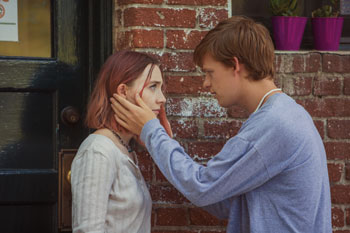 Question: so Christine has also denied her given name.
Question: so Christine has also denied her given name.
Greta Gerwig: Yes.
Question: Why does she do that? What does the name 'Lady Bird" signify?
Greta Gerwig: Re-naming is both a creative act and a religious act, it is one of authorship and a way of finding your true identity through creating a new one. It is a lie in service of the truth. In the Catholic tradition, you are given a confirmation name, to name yourself after a saint that you hope to emulate. In rock and roll, you give yourself a new name (David Bowie, Madonna, etc.) in order to occupy this bigger mythical space.
Early in the writing process, I kept coming up against something that I couldn't break through. I put everything aside and wrote at the top of a blank page: 'Why won't you call me Lady Bird? You promised you would." I wanted to get to know this girl who makes everybody call her by this odd name. The name came out of something mysterious. I had not thought of it before I wrote it. I love the way it sounds. It's jaunty. It's old fashioned. Writing the script was getting to the heart of that girl.
Later, I remembered the Mother Goose rhyme 'Ladybird, ladybird, fly away home." It is about a mother returning home to make sure her children are safe. I do not know how these things lodge themselves in our brains, or why they come out when they do, but it seems to be an essential part of the creative process for me, the unconscious unfolding of something you know without knowing.
Question: So the story's structured around Lady Bird's senior year in high school. Why was that an important moment to set the film around?
Greta Gerwig: When you are a teenager in America, you organize your life around academic years: Freshman, Sophomore, Junior, Senior. It always made sense to me to tell the story of the whole year. The rituals of the year, the circularity. The way we end where we began. It is a spiraling upwards. Senior year burns brightly and is also disappearing as quickly as it emerges. There is a certain vividness in worlds that are coming to an end. There is a pre-sentiment of loss, of 'lasts." This is true for both parents and children. It is something beautiful that you never appreciated and ends just as you come to understand it. The way time rushes forward is a theme of the film, one scene tumbling into the next. We can never hold onto it. 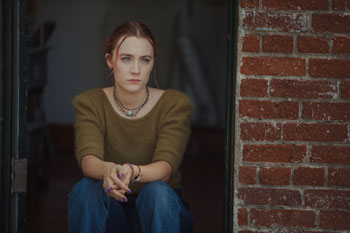 Question: So you mentioned that you've co-written screenplays before, but this is the first time that you've directed?
Question: So you mentioned that you've co-written screenplays before, but this is the first time that you've directed?
Greta Gerwig: Yes.
Question: As you wrote the script, did you always intend to direct it?
Greta Gerwig: Writing for me takes a very long time. I don't even really know how long. Maybe years, because it isn't linear. It's a character or a scene here and there. I tend to overwrite, hundreds of pages worth of dross. Eventually I'll pare it down and find the essence. While I'm writing, though, it seems impossible that it will ever be a movie. So the idea of directing wasn't consciously something I was considering.
However, once I had the script finished, I knew I would direct it. And I knew that it was what I had been intending all along. I just couldn't let myself know it because it would have frightened me. I've wanted to direct for as long as I can remember, but courage is not something that grows overnight.
Question: And what was the process of directing it like? What did you learn through that process?
Greta Gerwig: I am still learning about directing, and hopefully I will never stop, even when I am in my eighties and just repeating myself. To catalogue everything I've learned would be both boring and impossible.
One thing I can say for certain is 'always hire people who are smarter than you are." That quote came from the late, great cinematographer Harris Savides, by way of my director of photography, Sam Levy. This is true for everyone from actors to set decorators to poster designers. I had the great luck of being surrounded by people who were, indeed, smarter than me.
The other thing is that the title 'director" isn't quite right. It implies that everything is there in front of you, only needing to be 'directed." I think the French have it expressed more accurately, as the 'réalisateur." The director is the person who 'realizes" the film. As in they cause it to happen, give it actualized form, make it exist. No one will ever know the films you don't make, and they have no earthly reason for existence, other than that you realize them. 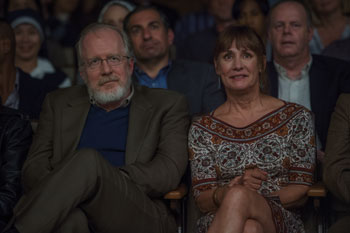 Question: What were some of the biggest surprises you encountered while you were making the film?
Question: What were some of the biggest surprises you encountered while you were making the film?
Greta Gerwig: The caliber of collaborators I had is the biggest surprise, and the one I am most grateful for. I just couldn't believe that these wildly talented people were dedicating their time and their gifts to this film. From Scott Rudin and IAC Films signing on to make it, to Lois Smith showing up to play Sister Sarah Joan, every person involved was far beyond what I could have imagined. That was surprising. It continues to be surprising.
Question: What were some of the biggest challenges and rewards of the process of making the film?
Greta Gerwig: The most rewarding thing was watching the actors work. I had written these lines alone, and heard them in my head, but suddenly they were being brought to life and embodied in ways that were far better than I could have ever imagined. I think there are some directors who wish they could clone themselves and do every job, but I am not one of those directors. The process of letting other people bring their whole selves to it, their spirit and their creativity, is one of the great joys of the process. The challenges? Every step was a challenge, but all of that falls away in my memory of making it.
Question: How do you think the fact that you come from the world of acting influences your style as a Director?
Greta Gerwig: Having worked as an actor, one thing I am very sensitive about is the audition process. I've been in a lot of humiliating audition situations, and I know what it feels like to bring in something you've really toiled over and have the people not even look up at you. I couldn't cast every wonderful actor that I saw, but I could give them respect and consideration while they shared their art with me.
I also have a very strong sense that actors need to have a secret world outside of the director. They need their own connections with each other, and I don't think the director really needs to be a part of that. I wanted to give them this space to play. I would do things like set up a meeting with the costume designer and one of the actors that I wouldn't be at, because I wanted them to have their own private language, and the sense that they were creating this character together.
Of course, I would give input and say what I liked and didn't like, but I didn't want to intrude too much. Part of being an actor is really having to own the character, and if someone is always telling you, 'no, no, no, it's like this; it's like that" you never really feel like the part is yours. My job was to create a perimeter so they could take it over from me, because it wasn't mine anymore.
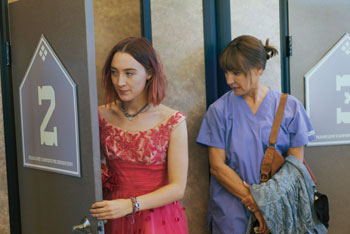 Question: Are you planning on directing more films going forward?
Question: Are you planning on directing more films going forward?
Greta Gerwig: Yes, I am. I will.
Question: How did you come to cast Saoirse, and what made her so perfect for the role of Lady Bird?
Greta Gerwig: I met with Saoirse Ronan at the Toronto Film Festival in 2015 when she was there for Brooklyn. I sat in her hotel room and read the entire script out loud with her. As soon as I heard her say the words, I knew beyond a doubt that she was Lady Bird. It was so different and so much better than I had imagined. She was willful and funny and heartbreaking, both universal and specific. She was going into rehearsals for The Crucible on Broadway, so it meant pushing the film for six months, but there was no other person who could have done it, it was hers two minutes into the read.
Question: What was the process like of developing the character with her, and how did that character evolve through the filming process?
Greta Gerwig: The scripts I've written barely change at all during filming. Every single line is said the way it was written. Film is not primarily a medium of words, but I come to it from a love of theatre, so for me the language is paramount.
However, the process of creating a character is a collage art. Saoirse was acting on Broadway, and I would feed her little pieces bit by bit. I would give her a novel or a poem or a song or a photograph. As we cast more people, I would gather them for mini-rehearsals. I wanted the actors to start creating a magical bubble of make believe with each other.
As we got deeper into rehearsal before filming, Saoirse and I spent hours talking together and hanging out so that by the time we were shooting, she would be the 8 person I'd ask about what Lady Bird would wear in a particular scene or how she would walk or sit. Saoirse developed an entire physicality around the character that informed the way I wanted to photograph her, the rhythm of the shooting and the emotion.
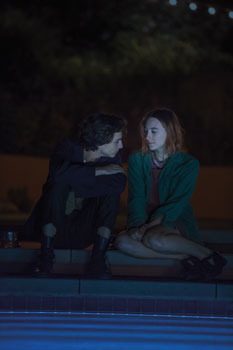 Question: There are a lot of relationships that you explore in this movie, but it feels like the heart of the film is a mother-daughter story.
Question: There are a lot of relationships that you explore in this movie, but it feels like the heart of the film is a mother-daughter story.
Greta Gerwig: Yes.
Question: Why did you choose to put this relationship in the center of the film?
Greta Gerwig: The mother-daughter relationship is the love story of the film. For a long time the working title of the movie was Mothers and Daughters.
Generally with films about teenage girls, the story centers around one boy: the prince charming, the answer to all of life's problems. And I don't find life to be like that at all.
Most women I know had infinitely beautiful, incredibly complicated relationships with their mothers in their teenage years. I wanted to make a film that put that at the center, where at every moment you feel empathy for both characters. I never wanted one to be 'right" and the other to be 'wrong." I wanted each to be painfully failing to reach each other, and I wanted to reward their ultimate love at the end. To me, those are the most moving of love stories. The romance between a mother and daughter is one of the richest I know.
Question: So, Laurie Metcalf.
Greta Gerwig: Oh, Laurie Metcalf.
Question: What made you feel like she was right for the part?
Greta Gerwig: I did not grow up watching television, so I didn't know Laurie from 'Roseanne." I knew her as one of the great stage actresses, a person who had shaped modern American theatre. I wanted someone with that much depth and range and power, like a prize- fighter who can level a competitor but also stay light on their feet. That is Laurie. She brings so much humanity and pathos to Marion and still has hairpin comic timing.
9 Her Midwestern-ness was also an aspect that deeply appealed to me. She and Tracy Letts are both from the Midwest and there is something very grounded about both of them. They are workmanlike, not showy or grandstanding, even though they both have more than enough talent to be that way. It was a good approximation of Sacramento's humility.
Before I had my meeting with her, I was doing press for a movie I had made with Ethan Hawke. I knew they had worked together in the theatre, so I asked him what the experience was like. Ethan stopped the next interviewer from coming in and grabbed me by the shoulders and said: 'If you should be so lucky that Laurie Metcalf would want work on your movie, you will see what a true artist is. Everyone else is just pretending to do what she actually does."
You can't really talk about a great athlete, you just have to watch them do it. As soon as we started rehearsing, it was all there. We could have shot it the first day.
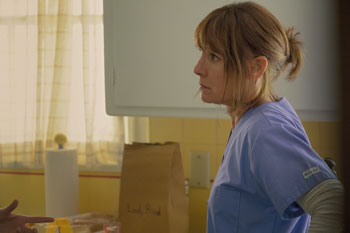 Question: In what ways do you see Lady Bird and Marion being similar to each other? In what ways are they different, and how do you see the similarities and differences playing into their tension?
Question: In what ways do you see Lady Bird and Marion being similar to each other? In what ways are they different, and how do you see the similarities and differences playing into their tension?
Greta Gerwig: Lady Bird and Marion are two sides of the same coin. Their similarities are what make them so close and also so contentious. I loved that Saoirse and Laurie were almost the exact same height. From the very first shot, I wanted to show them to each be the other's other side. One person and yet separated.
Some of this is generational. Growing up as a woman in America was something completely different for Marion than it was for Lady Bird. As a woman born in the 1980s, Lady Bird is part of the generation where it was suddenly possible to have big, ambitious dreams for yourself. Marion comes out of the post-World War II 1950s culture. Roe v. Wade would have been passed while she was in her twenties. Her parents would have lived through the Depression. Even arguments about 'how we treat our things" are deeply rooted in their respective generations. I think we underestimate how much those differences cause tension between mothers and daughters.
Question: Their relationship feels extraordinarily real. What was the process like of working with them to develop this dynamic?
Greta Gerwig: As anyone who has fought with a family member knows, there is never really a new fight. You've had it a million times. It's these well-worn grooves where you could almost recite the other person's lines for them. I wanted to create that sense of repetition, of a lifetime of fighting and making up.
We shot the first scene in the last week, the massive fight in the car. By then, they were completely locked into each other. They knew each other's rhythms and energy. I think that one dysfunctional way people can express intimacy is to fight, because you only fight with people you really know. I wanted that fight to feel intimate. From the very first take, they were on fire. For a long time in the edit, I was using the entire shot from that first take. That was how alive and connected they were.
Question: What about Lady Bird and her father, Larry? What is that relationship like, and how does it differ?
Greta Gerwig: Larry is Lady Bird's hero. She adores him completely and cannot bear that she has caused him pain or that he has sadness that she cannot fix.
I love Tracy Letts as an actor and as a writer, but I felt that I had never seen him cast in a very gentle part. He often plays people who are intellectually rigorous and strong but bordering on assholes. And he's great at all of that. However, when I met him at Sundance, and he was so warm and had this real sweetness about him that I had never really seen explored, either on stage or in a film. He was Larry to me. Brilliant and kind and able to bring emotional depth to this character.
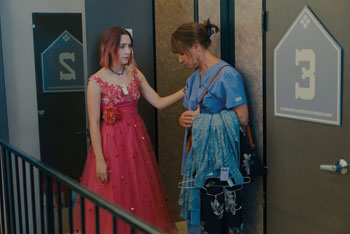 Question: What is Larry's role within the family dynamic?
Question: What is Larry's role within the family dynamic?
Greta Gerwig: Larry is the person who quietly balances everyone. He is the ballast. He loves his wife and he loves his daughter and he wants them to see each other the way he sees them.
Question: Tell me about working with Tracy, fleshing out the character.
Greta Gerwig: Tracy is one of my favorite writers of all time, and what I valued most about working with him as an actor was how he would talk to me about my script. He is one of the most intelligent readers of scripts I've ever encountered. He wants to understand it from the inside out. Some of the questions he posed helped me to sharpen my script and hone my instincts for what I was going for. He is economical as an artist and encouraged me to find the essence of the piece. The things that were the most fruitful were his few well-placed comments and queries. It put us in a dialogue about the character and the film and made my movie richer and more realised.
Question: There's this sense that Marion and Larry have this intense backstory. There's a lot of history that's not overtly exposed in the film. Did you discuss with Laurie and Tracy a backstory for those characters? How did that get developed?
Greta Gerwig: There's a scene early on in the movie where Marion makes a joke, and Larry makes a joke back, and they both laugh. They both really laugh. To me, that says everything. They like each other. They're okay. Of course they have had good things and hard things over the years, and it has not all been easy, but this is not a story of a marriage in trouble. People who can laugh like that are okay. That is all Tracy and Laurie and the skill they have as actors to fill out the sense of a life in a minimum of time.
One piece of their backstory that we did discuss was Marion being older when they got married, and she didn't think she could get pregnant. So they adopted, but then she unexpectedly got pregnant. I could have laid it all out in an expo- sitional fashion, but families don't go around explaining themselves. They just exist the way they are, they know what bonds them together and makes them a unit. I've always liked movies that don't over-explain. Sometimes things in movies are explicitly spelled out, whereas in life, we just encounter all different types of families and don't always get a backstory. 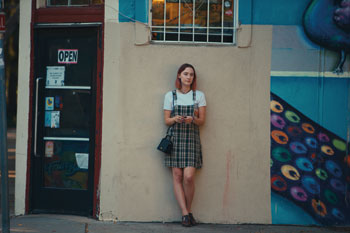 Question: Were their lives based in any way on your own parents?
Question: Were their lives based in any way on your own parents?
Greta Gerwig: They are their own characters, and exist in the fictional universe of the film. However, there is a generosity to my parents, their ability to open their home to people who need it, which I have always found very moving. They taught me that genetics isn't what makes family, love does, and that you must always share what you have in any way you can.
Question: Can you talk about Miguel and the actor who plays him, Jordan Rodrigues?
Greta Gerwig: I wanted Miguel's relationship to his parents to be much easier, much less fraught. He never fought his mother the way Lady Bird does. But he and Shelly have fallen into that strange liminal space that so many college graduates find themselves: you have graduated from college, but your adult life has yet to really begin. They are professionally stalled. Both are very smart (Berkeley) and very conscious (veganism), but they haven't figured out how to translate their ideals into modern work life. The piercings don't help. That caught-in-between thing that they are going through also provides nuance to Lady Bird's idea that college will be her chance to 'get out." It is the counterargument to that very straight narrative. I think we often imagine our lives to move in a line when really they are curving and swooping and doubling back.
Jordan was very funny in his audition, but he also has this incredibly sweet and vulnerable side, which was essential for where he had to go in the story. When he shows up at the job interview, you suddenly see his need and his fear. You see the child he was and the man he's still becoming.
It was very important to me that every single character outside of the main orbit of Lady Bird and her mom, whether it was Larry or Miguel and Shelly or Father Leviatch or Julie or Mr. Bruno, was a character that if you focused on any one of them, you could make a whole movie about their lives. That they were real people. That they were not just functions in Lady Bird's life. Everyone is in their own opera. In a big ensemble movie, you don't have a ton of time with every person, so every scene needs to be impactful. To do that, you need actors that can bring that sense of a whole life outside of the moment you're seeing them in. Miguel is an annoyed older brother, but then also just a struggling kid himself. 13
Question: How did you come to cast Lucas Hedges in the role of Danny?
Greta Gerwig: I saw Lucas in Manchester by the Sea at Sundance at one of those 8:00 in the morning screenings and afterwards I couldn't stop crying or thinking about his brilliant performance. We got him the script and I met with him in Los Angeles and told him he could play any part he wanted to. He picked Danny, which was exactly what I was hoping he'd do.
 Question: What is it that Lady Bird finds particularly appealing or attractive about Danny? Lady Bird is at that moment where she loves love and is looking for an object to project that onto, and Danny is such a good object. He's nice and he's handsome and he's the kind of boyfriend you dream your daughter brings home.
Question: What is it that Lady Bird finds particularly appealing or attractive about Danny? Lady Bird is at that moment where she loves love and is looking for an object to project that onto, and Danny is such a good object. He's nice and he's handsome and he's the kind of boyfriend you dream your daughter brings home.
What I always felt about Danny was that Lady Bird isn't wrong to love him, she's just wrong about what form it should take. The thing she feels drawn to is still real. No, he isn't being his true self, and he isn't ultimately interested in her romantically. But he really does like her, and he really does want to be around her, because she is wild and arrogant and free. He just is so crushed by certain expectations of his family and the world of the Catholic community in 2002.
So much progress was made in LGBTQ rights and awareness in the past fifteen years, but 2002 was a distinctly different era, especially in places that weren't big urban centers. When I was in high school, no one was 'out." No one. You couldn't be. You would be beaten up or worse. Thank God that's changed. But it is not ancient history. That just happened. Now, it's such an amazing thing to see kids feel more comfortable in their own skin and accepted by their communities. Danny so badly wants to be the person that Lady Bird wants him to be, and although it is a denial of who he is, it is still incredibly loving and endearing. He wishes he could be her perfect boyfriend. But he ends up being her perfect friend.
Question: What impact does that relationship have on Lady Bird?
Greta Gerwig: Initially, Lady Bird sees Danny as being part of the story of her life without seeing his story. Then, when he visits her at the coffee shop, that is the moment when Lady Bird starts her transformation and sees him as a person with his own narrative.
I don't think people change in an instant. But in that moment, suddenly the weight of his personhood hits her, and that is when her story starts to turn.
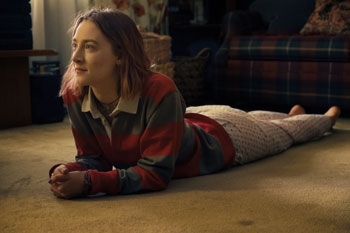 Question: let's talk about Kyle. How did you come to cast Timothée in the role?
Question: let's talk about Kyle. How did you come to cast Timothée in the role?
Greta Gerwig: Timothée auditioned for me, and he was just a tremendous actor, so young and talented and intelligent. He went to Columbia University, he's a pianist, he speaks French and Italian and he's honestly quite intimidating. There was something about his supreme intellect that I thought would work really well for Kyle. Kyle is a frustrating character, but he's very sharp. It's easy to laugh at his ideas, but they are grounded in real capacity for deep thought. Timothée could do it in a way that felt authentic.
I gave him a lot of literature to read about socialism, economic theory, and mathematics, and also academic writing about the internet. There is a book of essays called The Internet Does Not Exist, which I loved, and gave my copy to Timmy. He read it, as well as the notes I had taken in the margins. He was slightly shocked that I shared so much of Kyle's worldview. He said to me, 'Everyone will think that you're Lady Bird, but actually, you're Kyle." I had him watch My Night At Maud's, the Eric Rohmer film, so he could absorb the rhythms of a young man who is certain he is right talking at a woman, not to her.
Question: What is it that lady bird finds attractive specifically about Kyle?
Greta Gerwig: Through Kyle, Lady Bird experiences that knock-you-over sexual attraction for the first time. The stage directions read 'She understands all R&B songs in one second." It is true lust. She constructs a narrative about him that doesn't exist, because that's what teenage girls do.
I would play a lot of songs from John Hughes movies on the set, from Pretty in Pink and Sixteen Candles. Movies that I love. Women are raised on these romances, and they are very hard to shake as ideals. Even when it is incredibly clear that the object of your affection is not behaving like a movie-star heartthrob. I wanted the film to both be inside of the fantasy and outside of it: to feel the intensity of the emotions while acknowledging that they are a house built on sand.
Question: How did you find Beanie Feldstein for the part of Julie?
Greta Gerwig: Beanie Feldstein walked in and auditioned for Julie, and she did exactly the performance you see in the movie. It was just right there, right away. It was very emotional, very open, funny but not arch, and never self-pitying. There was a resilience in it. After she walked out of the audition room, I had a full-on Hollywood moment of turning to the casting directors and saying, 'That is our Julie."
Question: What does that friendship mean to the character of Lady Bird?
Greta Gerwig: It is the pure friendship-love of her youth. There is a quality, when you fall in friendship-love with someone in high school" and usually I think it happens in high school because it is the first time you have any real autonomy"where you literally could spend every waking hour with them and still want more. The minute you are dropped off at your house, you call them and say, 'What are you doing now?"
I like appropriating movie tropes from girl-boy romances for other relationships, like a mother running through the airport to find her daughter, not a man looking for a woman. Similarly, the moment when Lady Bird goes and gets Julie for prom, it has the same feeling of 'Go get your girl!" that you get from heterosexual love stories. It's the boombox-over-the-head moment, but with your best friend.
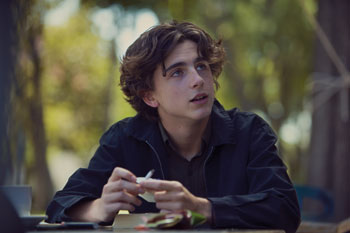 Question: I couldn't help but notice that a large chunk of the cast has theatre backgrounds.
Question: I couldn't help but notice that a large chunk of the cast has theatre backgrounds.
Greta Gerwig: Yes.
Question: Was that a conscious choice while you were casting or did it just sort of happen organically?
Greta Gerwig: I love theatre actors. I love theatre. I'm a theatre nerd. My first love was theatre and I've never gotten over it. The veteran actors in this film, Lois Smith, Stephen McKinley Henderson, Laurie Metcalf, and Tracy Letts, are people that I've watched and admired and read about for years. They are these giants of American theatre. Having Scott Rudin's help was key in accessing this caliber of actor. Every time I go to his office, I see all the posters on the wall, and they represent the very best of film and theatre, some of my favorite things ever made.
Question: Let's talk a little bit about the specific year when the film is set, 2002.
Greta Gerwig: The glib answer is that I wasn't interested in shooting smartphones. If you make a film about teenagers now, so much of their lives happen online that I don't know how you'd make a movie about them without shooting a lot of screens.
The more honest answer is that I wanted to make a film that took place immediately in the post-9/11 world, what I think of as ushering in an entirely new era which we are only now beginning to understand. My goal was not to comment on global politics or domestic economy, but to present it. We lived through the complete erosion of the middle class. We are still living within that new economic landscape. The invasion of Iraq is a very vivid memory for me, although I was in college, not high school, when it happened. And, of course, we are still there today, we have not pulled out all of the troops. I was interested in the modern televised war, the propaganda of it and the theatre of it. How the horror is both available to you but also completely managed and distant.
There is the terror of war and the uncertainty of the job market, and there are also crushes and friendships. Life doesn't divide itself up into subjects. There's not history over there and personal life over here. It all happens together.
Question: You talked a little bit about how the iconography and the narratives of Catholicism have influenced you as an artist and your point of view. How do you think that Catholicism figures in Lady Bird's life?
Greta Gerwig: Early in the film, during the credit sequence in the church, the first words spoken are: 'In the name of the Father, the Son, and the Holy Spirit." This is always said in mass, all the time, constantly. As a teenage girl, you think: 'Well, where am I in those people? I'm not a father, son or holy spirit." I guess you could strive to be the Virgin Mary, but that seems to be off to the side, not the main event, somehow. It's a feeling of, 'Where do I fit in this patriarchal structure?"
I think religion is storytelling, a way to create meaning in life, and it's difficult if you don't see yourself reflected in it. Lady Bird is running into this problem, and railing against it.
However, Lois Smith's character, Sister Sarah Joan, presents an alternative side to Catholicism. She is not gushy or saccharine, but she is solid and loving in a matter- of-fact way. She's a bit of a hard-ass, but very invested in the lives of her students. She presents another option, another way of expressing faith.
The idea of grace, theologically, is fascinating to me. It is not something that you can earn, it is given to you. It is not because you're a good person that you get to experience grace. Baptism is a moment of grace. You could see it as saving babies from hell, but you could also see it as experiencing love and grace before you have been able to do anything at all to 'deserve" it. A definition of grace that I've heard is that it is generous, free and totally unexpected and undeserved. This kind of grace continually happens to Lady Bird, and her journey is one of accepting it.
Lady Bird is not a specifically religious character, and she doesn't have a mystical experience, but it is the occasion for her transformation. The place that she is from and the tradition she was raised in gave her both roots and wings. She goes back to the church in the end because it is home, but she cannot stay there. She can only move forward and accept the gifts that have been given to her and say 'thank you."
Question: What role do you see class playing in the film? Lady Bird has some clear shame surrounding her own class status. Why is that important to the character?
Greta Gerwig: I don't think anyone ever feels like they have enough or are enough. Lady Bird's particular fixation with class is grounded in something real: her family is struggling financially. Also, they are caught in a squeezed middle class, where the majority of resources and money are being shifted to the top. However, one of the themes of the film is recognizing the riches of your life, understanding how much you have, not how little you have. In a hyper-capitalist society where there are have and have-nots, it's difficult to connect with the feeling of 'enough," but it is part of her journey.
Also, I think girls have it much rougher than boys when it comes to connecting their self-worth to their family's financial situation. Boys had the same pressure, but there was less status conferred by things, and they always had the escape route of sports. If you were good at sports, you were safe. The culture of girls centered around how much money your shoes cost and how fancy your car was.
Part of being a teenage girl was wearing your money by the brands on your clothes. You wanted people to know how much you spent on what you owned. It is something that Lady Bird both finds incredibly distasteful but also envies.
Question: Why did you choose to end the movie in New York after Lady Bird went off to college?
Greta Gerwig: I don't think endings are ever real endings and I don't think beginnings are ever real beginnings. You are always in the process of looking backwards and wrapping up a story that seems to have ostensibly ended. Taking off in the plane: that's a false ending, and a false beginning of a new story. She isn't done with her old life simply because she gets on a plane.
There is a Quaker concept that I thought about while making this film, the idea of 'Way Opening" and also 'Way Closing." 'Way Opening" is the feeling that the next steps are clear to you, that where you have to walk is laid out for you. 'Way Closing" is the opposite. It is looking back from where you came and realising that the doors are closed. The end of the film is a moment of both 'Way Opening" and 'Way Closing." There is nowhere to go but forward, as you can never run backwards into childhood. You can just express your thanks and put one foot in front of the other into your new life.
Question: Okay. Let's talk a little bit about some technical aspects of the film. Tell me about your collaboration with cinematographer Sam Levy and what you guys were aiming for with the look of the film.
Greta Gerwig: Sam Levy has shot three movies that I've been in, two of which I co-wrote, and I've been incredibly blessed to have him as a collaborator. I love the way he sees the world. We would spend hours together looking at photographs and films, shot listing and talking about movies. There was a shared language we had that came through years of work together and I trust him completely. He felt like the other half of myself, and we had a shorthand that was invaluable while making the film.
I wanted every shot to be very specifically framed, like a Medieval triptych, quite presentational. Nothing shaky or handheld or documentary. We talked about always having a sense of the proscenium, of the film unfolding in a series of placed scenes like Stations of the Cross presents the story of the Passion.
I had always seen the story as a kind of an allegory and I wanted the photography to reflect that.
We also wanted the color to look like a memory of a time, not to be literally exactly how the world looks. At the same time, we didn't want to pretty it up too much. I wanted Sacramento to look beautiful because it was portrayed honestly, the same way I wanted the characters to be beautiful because of their flaws, not in spite of them. We looked at the paintings of Wayne Thiebaud and Gregory Kondos because they captured the color and the flatness and the beauty that is specific to Northern California. The density of the pastels they used always feels like home to me.
So to achieve that Sam Levy and I worked very closely with our colorist, Alex Bickel, who is a real artist. He was with us from the beginning, and helped us to set the look of the film. There were a lot of tests, a lot of trial and error to find our look.
I kept saying that I wanted to feel as if the film was 'over there." I always wanted to feel the frame and to feel the medium of cinema.
Question: Tell me about the experience of editing the film and working with Nick Houy.
Greta Gerwig: Nick Houy actually came to me through Jen Lame, who had edited Frances Ha and Mistress America. Editing is like writing the film again, and when Nick initially read the script, he responded with very careful notes that felt like a writer.
He understood the tone we were going for, how it was like a pop song that you only realize is sad when someone else covers it at a slower tempo and you really listen to the words.
I like films that catch in the middle, that you don't realize are weaving a story underneath you. Mike Leigh is one of my favorite filmmakers, and his films have that quality. Nick Houy understood the lightness I wanted, the way the film would be frothy and exciting like waves breaking on a beach, but that then suddenly the undertow would become apparent and before you know it, you are in much deeper waters than you expected. 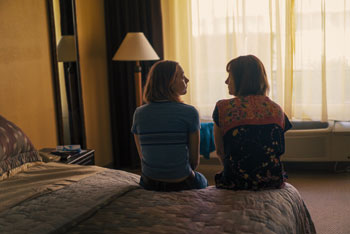 Question: Anything you had to remove that you really loved in the editing? Anything that had to go?
Question: Anything you had to remove that you really loved in the editing? Anything that had to go?
Greta Gerwig: Most of what was in the script is in the movie. Because I wrote a few other films and was very involved with the editing process, I had a good sense of what we would want in the final version.
There were some things. A goodbye between Julie and Lady Bird which I had to remove because it felt like they had already said goodbye. There was also a campaign speech when Lady Bird runs for Student Body which just didn't fit.
Mostly, though, the difficulty was recognising that I couldn't use every single great take that my actors gave me. I had to pick just a single line reading, and they all gave me such incredible material with every take.
Question: Each space that you use in the film has a very distinct personality. It completely fits the time period. It fits perfectly into the story. How did you and your production designer, Chris Jones, accomplish this?
Greta Gerwig: I met Chris Jones when I worked on Mike Mills' movie 20th Century Women. That film had such a specific world. It was Santa Barbara in 1979 and he did an incredible job at creating something very particular. He was sensitive and careful. He knows the meaning of one chair versus another chair, if that makes sense. He knows that objects carry story and psychology and personality. Also, Chris is a painter and so he has a very strong sense of color and the emotion of color. He treated every set as a still-life painting, you could photograph it all on its own and it would transmit so much information and feeling.
Question: Okay. The costumes. They're unassuming, but every costume is incredibly specific and perfectly fits the character. Can you tell us about your collaboration with April Napier?
Greta Gerwig: April Napier also came as a recommendation from Mike Mills. I sat down to meet her and we were wearing the exact same outfit. That felt like a sign if there ever was one.
I gave her yearbooks to look at and we dug up old snapshots and magazines, all of the usual research, but I think what was really magical about her process was how she collaborated with the actors. They would have meetings on their own and then show me what they had discovered. She and Beanie came up with the little clips that Julie wears in her hair and her white Skechers. That kind of attention to detail is always what I'm looking for. I see every department as telling the story through their particular medium, and for her it was clothes.
Question: What about the score? What was the process like of working with Jon Brion? What did you want to achieve with the music?
Greta Gerwig: Jon Brion is my all time favorite musician/composer/producer, and working with him was a dream come true. It is an old-fashioned movie score with melody, which is exactly what I had hoped for. I didn't want the score to feel like background or ambient, I wanted it to be very present and structured, in the foreground of the storytelling. The very first conversation we had he played a sketch of what would become the theme of the film. Lady Bird's theme, this descending tumbling melody, a falling down and getting back up. He already had an idea of woodwinds, which felt more delicate than strings but just as emotional.
He's nocturnal so I would fly to LA and I'd stay up with him all night. He'd start working on it at around 10 p.m. and stop around 6 a.m. We would talk, watch scenes from the movie, and then he would sit at the piano and write beautiful melodies to picture. Then we would stop and talk some more. About movies and life and everything. Sometimes I would just explain a feeling to him, and then he'd play something on the piano which was literally the musical equivalent to that feeling. Bit by bit, he built our score this way.
Question: The songs you selected for the film: they manage to underscore the emotional beats, and they also capture the time period. Tell me about making those choices and why you made them?
Greta Gerwig: I wanted the songs in the film, the needle drop moments, to be a real reflection of teenage taste at that time and in that place. I didn't want characters to be listening to music that they wouldn't actually know. Music is how teenagers connect to the world 'out there," how they find articulation for their lust, their angst, their yearning. 22 Some of the songs that are in the film I wrote into the script, like Alanis Morissette's 'Hand in My Pocket" and Dave Matthews' 'Crash Into Me." Alanis because she was my Patti Smith, my Kate Bush, my Stevie Nicks. She was a woman who wrote her own music and lyrics and performed the hell out of these very emotional songs that felt like they were written just for me. And I've always thought 'Crash" is up there with the most romantic songs ever written. I remember playing it on a loop and feeling like nobody would ever kiss me. I don't know any other song that connects more deeply to teenage longing. Justin Timberlake's 'Cry Me a River" owned the 2002–03 bridge and is so snarly and sexy and of that exact moment.
Often with period movies, the music and the design will all be from that exact year. If it takes place in 1955 suddenly every car on the road is from 1955, but that's not how the world works. You also have cars from 1951. Not all the fashion would be exactly up to date. It is the same with music"the hits from the 1990s were still on the radio.
Lady Bird
Release Date: February 18th, 2018
Have You Seen This?
MORE
- Mission: Impossible Fallout
- Glenn Close The Wife
- Allison Chhorn Stanley's Mouth Interview
- Benicio Del Toro Sicario: Day of the Soldado
- Dame Judi Dench Tea With The Dames
- Sandra Bullock Ocean's 8
- Chris Pratt Jurassic World: Fallen Kingdom
- Claudia Sangiorgi Dalimore and Michelle Grace...
- Rachel McAdams Disobedience Interview
- Sebastián Lelio and Alessandro Nivola...
- Perri Cummings Trench Interview




